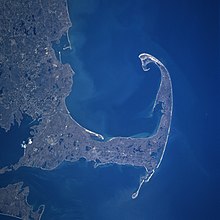Cape Cod
Appearance

Cape Cod, constituting Barnstable County, Massachusetts, is a peninsula extending into the Atlantic Ocean from the southeastern corner of the mainland of the state of Massachusetts. During the summer season, Cape Cod attracts many tourists.
| This geography-related article is a stub. You can help out with Wikiquote by expanding it! |
Quotes
[edit]- While the old Cape houses we see today seem just as firmly planted as ever, many are far removed from their original sites. Because they sat low to the ground, it was fairly easy to move them about with the aid of horses and rollers or to float them from place to place on barges. Houses were moved all over the Cape, and some were even floated across the Sound from Nantucket to the south shore of Cape Cod. It is said that they could be transported with contents intact and that, when stoves came into use, the fires were left burning so cooking could be done en route.
- Doris Doane, A Book of Cape Cod Houses. May 2008. p. 36. ISBN 9781567921137. (drawings by Howard L. Rich)
- ... I felt just so incredibly safe this trip, and everybody that lives here is so kind. And I just learned that, according to a census, that this is the highest LGBT community per capita of anywhere in the whole United States ...
- Michel Janse, (May 10, 2023)"VLOG: I took my dream SOLO trip to Cape Cod :–)". Michel Janse, Youtube. (quote at 32:10 of 33:57)
- Before the ocean rose to near its current level some six to eight thousand years ago, the Cape and Islands were just relatively nondescript ridges in an immense plain that stretched all the way to George's Bank. The first pioneer plants were probably various cold-weather berries, along with golden heather, poverty grass, and water lobelia. Mastodon and caribou wandered in, followed by the sturdy humans who made a living hunting them. Many of the smaller species of wildlife that now inhabit the various islands arrived by land as well, only to be isolated when the water rose, and ate away at both moraine and outwash plain. Nantucket and Martha's Vineyard each has its own particular subspecies of short-tailed shrew, both of which differ from the short-tailed shrew of the mainland.
- Cape Cod is the bared and bended arm of Massachusetts: the shoulder is at Buzzard's Bay; the elbow, or crazy-bone, at Cape Mallebarre; the wrist at Truro; and the sandy fist at Provincetown,—behind which the State stands on her guard, with her back to the Green Mountains, and her feet planted on the floor of the ocean, like an athlete protecting her Bay,—boxing with north-east storms, and, ever and anon, heaving up her Atlantic adversary from the lap of earth,—ready to thrust forward her other fist, which keeps guard the while upon her breast at Cape Ann.
- Henry David Thoreau, Cape Cod. 1908. pp. 4–5. (1st edition, 1865; Wikisource text)
